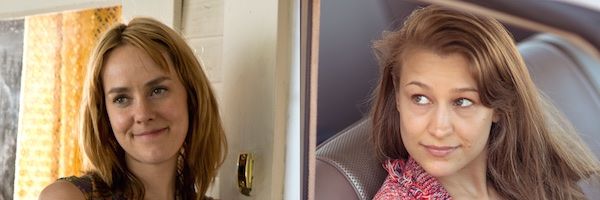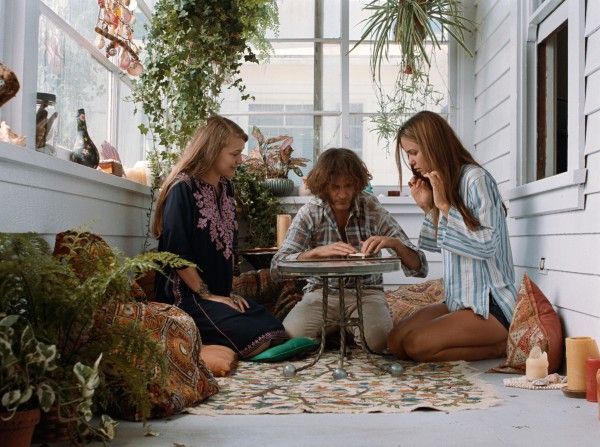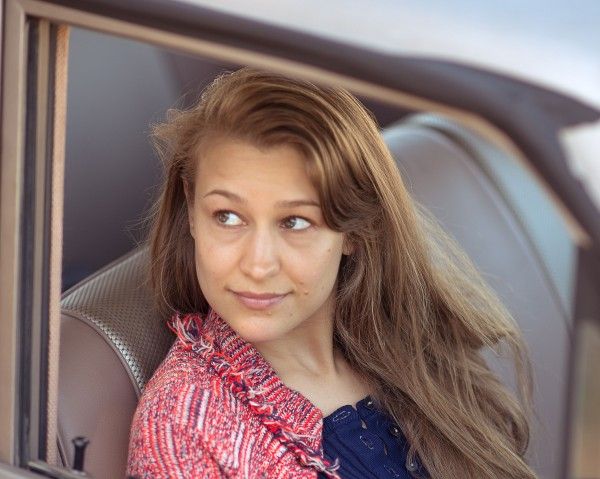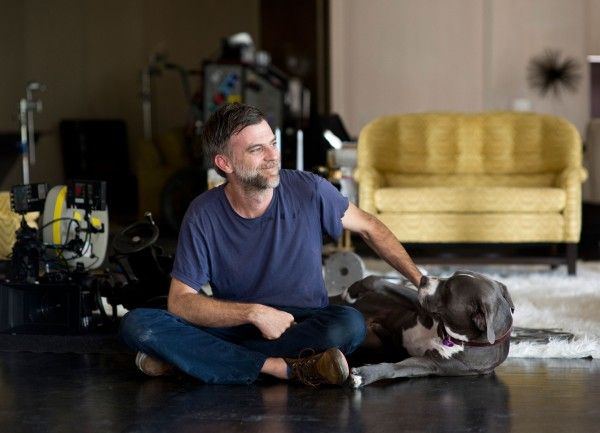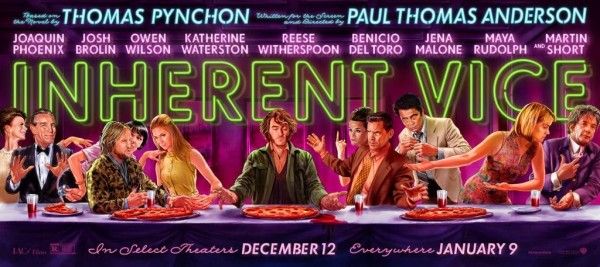I don't believe Jena Malone and Joanna Newsom's characters come into physical contact during the runtime of Inherent Vice, but they inhabit the more optimistic side of the journey Joaquin Phoenix's Doc Sportello embarks on in the film (Newsom also narrates the picture and remains unwaveringly gory in that regard as well). Accompanied by a few other journalists, I recently sat down with Malone and Newsom to talk about their roles in the film and what it was like being transported back into the 70's.
Inherent Vice is now playing in limited release before going wide on January 9th. It was directed by Paul Thomas Anderson from a script he adapted from the novel by Thomas Pynchon. It also stars Josh Brolin, Katherine Waterston, Owen Wilson, Reese Witherspoon, Benicio Del Toro, Eric Roberts, Martin Short, Sasha Pieterse, and more. I heartily (and respectfully) disagree with Matt’s review and urge you to see it as soon as possible. Hit the jump for the interview.
Question: What was the reveal about working with Paul Thomas Anderson? What was the whole discovery of how that process was like?
JENNA MALONE: I think about how mellow and also collaborative he is. I feel like he’s just sort of constantly editing and writing as he’s directing. And sort of being able to - he looks at a scene and doesn’t see it as it should be but as it’s constantly evolving. I think that takes a lot of courage, particularly when you have like a 50 man crew asking you what the next shot is. People really want to have a linear way of approaching their stuff and everyone wants to be on a time schedule and he’s really I don’t know, ballsy enough to just say, “I want to keep working this scene,” or “I want to shoot it over here,” or “I want to try it this way.” And he’s very kind of improvisational in the way that he’s approaching his stuff. I had no idea that’s how he approached it.
JOANNA NEWSOM: I feel like, to be a tightrope walker across in between two really tall buildings, the trick is to not think of the enormity of everything, you just kind of think about really lightly and casually walking on this tightrope. And I think similarly, even when he’s taking this enormous project that he’s put so much time and preparation and thought into, there’s just in this moment this real focus where he’s like, “I’m just walking across this tightrope, I’m not really thinking about how this is going to rip loud and impact my project.” He just kind of moves forward through it and I feel like he creates an environment in which that’s sort of the tone of everyone’s work.
MALONE: Yeah, it's conducive to that.
I’m curious about your perception of Sortilège on the film. It’s a character that exists within and outside the story, actually there’s kind of a magical side to it as well. How do you see the character interacting with the film?
NEWSOM: Yeah, it’s an interesting question because it was an interesting transition between the person I was playing on camera and the narrator because they’re sort of the same person but the narrator is omniscient and sees everything, and has sort of taken over the entire descriptive narrative voice from the book, which was wonderful and it was a joy to get to take that on. But then also, I’m just a stoner friend of Doc’s who rides shotgun. Or does she? This sort of mystical, perhaps apparition, is really fun, really, really fun to do. I don’t know if I have any insight beyond that.
The narrative dialogue was so interesting because it’s all this summer of love speak but there’s truth at the core of everything she’s saying. How much did you wrap your head around the sort of superfluous stuff?
NEWSOM: I think the movie is so faithfully an encapsulation of everything that’s beautiful about the book. And one of the things that is most beautiful and most impressive, I think, about Thomas Pynchon’s writing is this incredible balance between the light and the slapstick, and the sort of colloquial…
MALONE: And intensely real writing.
NEWSOM: Right. Exactly. He captures its period and he captures kind of the way people spoke in the 70’s but it’s through the filter of Thomas Pynchon’s weird absurdity where everyone has a name that has some odd, mythical reference to it. Everything is just twisted ever so slightly and then when you least expect it, he drops into these somber or mournful, or deeply poetic meditations on the way the fog looks moving down the garbage strewn street or whatnot. I just read the book a lot and loved it. I think that was how I kind of reconciled the different aspects you’re talking about and tried to convincingly repeat them.
There’s a couple of names in the movie, like the Krueger/Voorhees reference. Was that discussed at all? It adds this strange magical mist to the movie and I wasn’t sure if it was just this thing to fuck with stoners.
NEWSOM: I think that’s also about the book, that he’s constantly referencing what’s real, what’s political, and what’s human, and what’s completely imaginary. He’ll basically tie all of these different things. I think when he’s titling people, giving them names, he’s thinking of this sort of magic realism. I think we were pretty just faithful to the book.
MALONE: Yeah, in the sense that we didn’t change anything.
NEWSOM: I also think the absurdity of those names it very subtly sort of pushes towards the light hysteria that runs through the whole book. Paranoia and hysteria is just slightly on the edge where everyone’s trying to not freak out and they’re paranoid. These names are like, “There’s something weird about that name.” But you don’t have time to really exactly remember why or try to pull that reference from deep in your mind. But I do think it’s all part of conjuring that paranoid, odd…
MALONE: Yeah, which he does well. It’s a hard thing to write, to be fair.
Your character has snatched victory from the jaws of defeat and is always trying to keep tragedy at bay. She’s not naïve but she’s optimistic.
MALONE: Yeah, if we’re talking of sort of the importance of names. Her name’s Hope. You just described hope in a nutshell, what is human hope? It’s ignorance, it’s want, it’s this blissful something. She grounds it in a way. I think that within all of these paranoid almosts and these sort of situations that she’s finding herself in, she has the most direct intent, which is just love, which is just clarity.
I think that’s one thing that kind of dispels the smoke around Doc that kind of makes his journey a little bit more linear, even if it’s just for a second. Eventually it does become—he does reunite with his lovers. So, there is something hopeful but very real about her. She’s not pulling his mutton chops in different directions. It was nice that she’s had this sort of grounded thing. I think we need it.
I loved the teeth, they’re not a very overbearing prosthetic. The first thing I saw you on the film, I was like, “There’s something really different about her.”
MALONE: I appreciate that. No, the teeth were fun, that’s part of it. That was also part of the aura, it’s getting into someone else’s body. The right teeth didn’t come until almost the last moment, so it was about figuring out how to talk without having that retainer thing constantly touching your teeth with your tongue. It was like being a teenager and I was like, “Okay, maybe that’s a compliment.” But I don’t know.
Can you talk about working with Joaquin and witnessing his approach as an actor and how is that similar or different to your own approaches as actresses?
NEWSOM: I think you should take this.
MALONE: Because it’s also the first time you’re sort of approaching things, so it must have been different as well. This is your first film, amen! You know what I mean? It’s such different actors and variations. I don’t know he’s very present and very generous. When people are very talented, I feel like their talent kind of becomes what’s unapproachable about them. But what’s true about Joaquin is that he’s so approachable. He’s the top factor that just within the scene makes you feel like you can take your coat off, and your purse off, and your shoes on, and just kind of dig in and play.
I don’t think it’s about this idea that he was always in character or not. He just became and he was constantly making decisions and choices, and following instincts within Doc’s journey. It was just a beautiful thing to watch. I think he’s so talented, it was fun to kind of just play with him.
Did you forget that this was Joaquin? Did he so become Doc in those scenes with you that it’s just, here’s Doc?
MALONE: I think he’s gonna be forever Doc in my mind just because that’s kind of how I got to know him in a way.
NEWSOM: On set, I would say it was less about him always being in character as you’re saying, than it was him always hovering right near the border of the character where I don’t think he did much to really pull himself super far out of that place. One thing that was born of me not having acted really before, is that I never experienced this feeling of sitting in front of someone and then the scene begins and in his case, because he’s such an incredibly amazing actor, there was like a chemical change - almost cellular level. There was this thing that happened like every aspect of him shifted and exactly what you’re talking about, this presence and this complete belief in the moment had the effect also of gravitationally pulling me into that same moment.
MALONE: And everything - props, objects, people.
NEWSOM: Yeah, it was enormously helpful for me because I didn’t really know what to hold on to. And then I was like, “Oh! I’m holding on to the fact that this person believes I’m my character, like so much that I now do.”
MALONE: And it’s nice that there was a lightness to it because I’ve seen that kind of chemical equation of acting where it becomes so serious, so muted in a way. It’s such a contained energy. I feel like with Joaquin, it’s just given and shared and joyous in a way. We’re laughing at our mistakes and we’re trying to remember what we did. It was really a pleasure working on this set.
As you dug into 1970 Southern California, what was interesting to kind of wrap your head around, as far as what was very different about that era? And what was kind of exactly the same?
MALONE: I mean, gosh, there’s so many things that are different and the same. I feel like for me, it’s more you know, growing up in Los Angeles, you have this built in nostalgia of what it was and trying to find this hidden seed of it. I feel like that’s more what I was drawn to, which kind of took on the more physical [attributes] of remembering times without seat belts and what was safety for children. Because the fabrics come and go, buildings come and go, all of that just becomes - you’re not aware what society you’re in while you’re in it. I don’t think it was that important to become a different person because of it. I think it was more about getting to witness Los Angeles in a different time that I wasn’t even born. It felt really beautiful.
NEWSOM: I like that. I like what you just said about the seat belts.
MALONE: Right? Because it’s just funny little things.
NEWSOM: Yeah, it is for sure. Because there are these kind of these big sweeping ins that you use and which I tried to. I probably know and love more records from early to mid-70’s than I do from today. They’re these really aesthetic things to hold to but it’s much more subtle and kind of fragile, these little tiny things. Sort of along the same lines of what you’re saying, I think I just kept trying to remind myself that the kind of mystical that Sortilege is kind of tiresome today but was new and still being discovered at the time of this story. Few enough people still were in that space in their brains that there was a bravery to it, where as now it’s just become like pop spirituality.
MALONE: It’s true but it’s funny because it really is - you see so much of the film and you’re like, “This is still L.A.” With the self help groups, and the going away to Ohio, all of these things have been happening since the beginning of time, really. I’m sure here, there’s this energy that exists here that hasn’t really changed that much.

